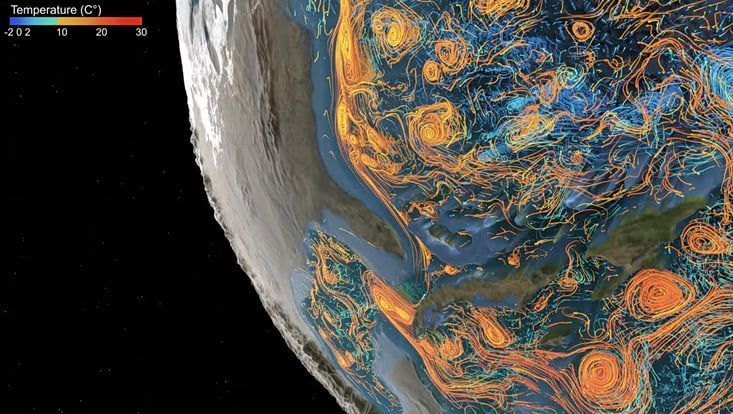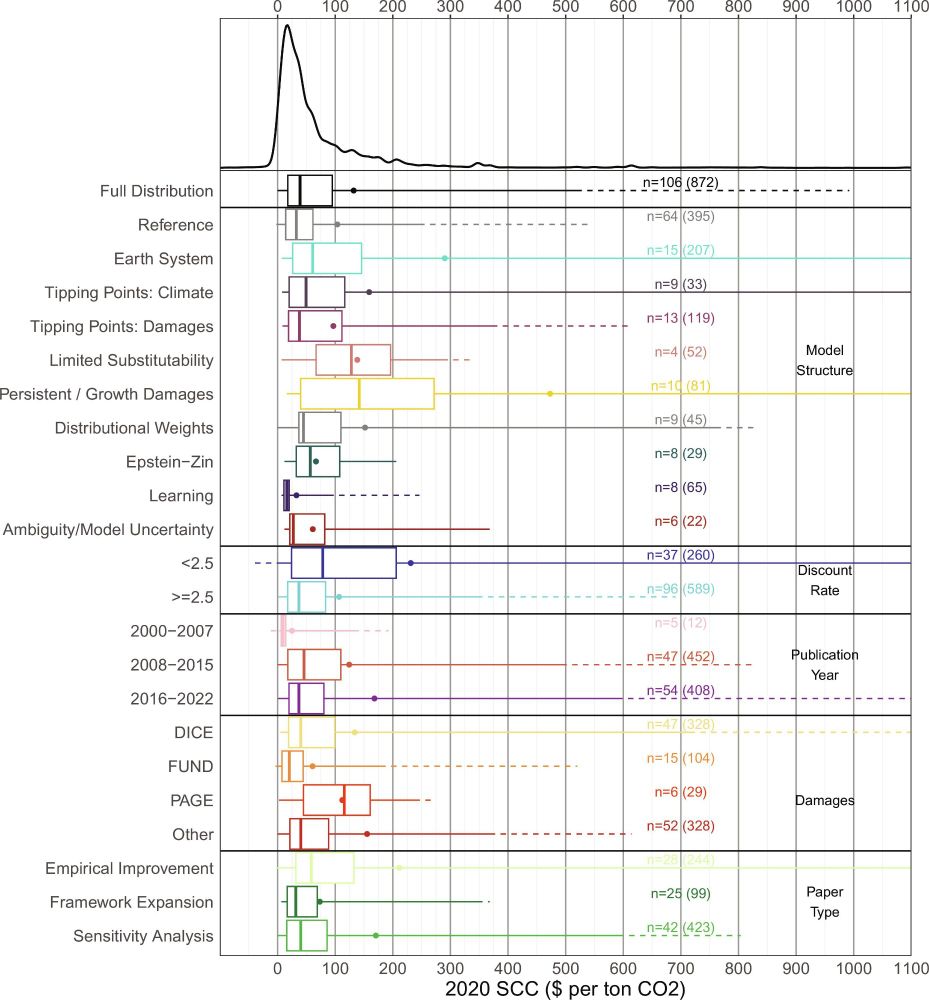
Poster advertising EGU26 session ITS2.5/CL0.5, titled "AMOC impacts: Physical, Biogeochemical, and Societal"
Planning to attend #EGU26?
Interested in the impacts of AMOC weakening?
New session alert! 🚨🌊🧪
ITS2.5/CL0.5: "AMOC impacts: physical, biogeochemical, and societal"
Check out our interdisciplinary session description & submit your abstract here: meetingorganizer.copernicus.org/EGU26/sessio...
22.10.2025 09:37 — 👍 16 🔁 5 💬 1 📌 0
Is Climate Overshoot the New Tipping Points? – Climate Matters
Is "overshoot" replacing "tipping points" in the climate discourse?
I wrote a short blog post exploring this idea.
Bottom line: it's all about urgency and irreversibility, but overshoot can circumvent some problems that the tipping points framing has.
Read the full post here: s.gwdg.de/wRWft8
26.09.2025 07:53 — 👍 2 🔁 0 💬 0 📌 0
YouTube video by MaxPlanckSociety
Billionen Kosten durch schwächere Meeresströmung | Wissen Was News
[Video] AMOC-Schwächung könnte Billionen kosten. Die #AMOC-Abschwächung verringert die #CO₂-Aufnahme, verstärkt die Erderwärmung & erhöht die Kosten - so die neue Studie von @felixschaumann.bsky.social & @edualastrue.bsky.social (MPI für Meteorologie). Carolin Riethmüller fasst für Euch zusammen➡️🔗
13.03.2025 16:52 — 👍 11 🔁 4 💬 0 📌 0
Thanks a lot! We look at the global ocean, so we didn't check whether AABW might counteract this, but the net effect is to recuce carbon uptake. The main difference to LGM studies is that we have emissions scenarios, so the downwelling water is relatively more carbon-rich than the upwelling water.
10.03.2025 20:47 — 👍 1 🔁 0 💬 0 📌 0

Overview of the modeling approach. (A) The Max Planck Institute Earth System Model is used to simulate climate states with an artificially weakened Atlantic Meridional Overturning Circulation (AMOC). (B) The resulting changes in annual ocean carbon storage are then analyzed as a function of the simulated AMOC. (C) The strength of the AMOC carbon feedback is estimated until 2100. (D) The economic impact of these projected changes is then analyzed.
Climate change could weaken the Atlantic Meridional Overturning Circulation (AMOC), which would cool the Northern Hemisphere. A weaker AMOC could also diminish ocean carbon uptake, thus increasing the social cost of carbon. In PNAS: www.pnas.org/doi/10.1073/...
03.03.2025 18:33 — 👍 11 🔁 5 💬 0 📌 1
Economic impact studies tend to find a weaker AMOC globally beneficial, as lower temperatures in the Northern Hemisphere would offset some global warming & associated economic damages - but new paper shows this ignores reduced C uptake by oceans & Social Cost of Carbon. See bsky.app/profile/feli...
02.03.2025 13:18 — 👍 7 🔁 6 💬 0 📌 2
Check out this great paper by @felixschaumann.bsky.social with @edualastrue.bsky.social out now in @pnas.org that integrates climate science with climate economics to study the social cost of carbon implications of reduced AMOC weakening. Super impressive work for a first PhD chapter👇
25.02.2025 21:04 — 👍 9 🔁 2 💬 0 📌 0
thanks!
26.02.2025 12:01 — 👍 1 🔁 0 💬 0 📌 0

Weaker ocean current could cost trillions
Faculties
💰 Weaker ocean circulation may cost trillions
A new study by @felixschaumann.bsky.social and @edualastrue.bsky.social in @pnas.org reveals that a weakening Atlantic Meridional Overturning Circulation (AMOC) could lead to costs of several trillion euros. #CLICCS #climate #ocean @uni-hamburg.de
25.02.2025 17:03 — 👍 17 🔁 9 💬 0 📌 2
No cheers for warming slowdown from potential weakening of AMOC given carbon drawdown impact. New study.
25.02.2025 12:28 — 👍 10 🔁 5 💬 0 📌 0
Die Abschwächung der #AMOC bietet neben den bereits oft prognostizierten Abkühlungseffekten für Nordeuropa weitere spannende Skills: Sie wird wohl auch die CO2-Aufnahmekapazität des Nordatlantiks verringern.
#Klimakrise #Nordatlantik #Ozean #Ozeanographie
25.02.2025 12:22 — 👍 8 🔁 7 💬 0 📌 0
[11/11]
Of interest? @ayeshatandon.carbonbrief.org @daisydunne.carbonbrief.org @klimareporter.bsky.social @fionaharvey.bsky.social @jonathan-watts.bsky.social @dpcarrington.bsky.social @muellerjung.bsky.social @sventitz.bsky.social @jonaswaack.bsky.social @fischblog.bsky.social @revkin.bsky.social
25.02.2025 08:54 — 👍 4 🔁 0 💬 0 📌 0
mas.to
[10/11]
📖 If you are still curious, check out the news items by the CEN research center @cenunihh.bsky.social of the University of Hamburg @uni-hamburg.de and the Max Planck Institute for Meteorology (mas.to/@MPI_Meteo@w...).
25.02.2025 08:52 — 👍 8 🔁 0 💬 1 📌 0
[9/11] Where to go from here?
With one more impact channel of AMOC weakening - probably not the most relevant - the picture already changes quite a bit.
A lot of other impacts remain, and we should research them if we want to properly understand the risks that are associated with a changing AMOC.
25.02.2025 08:50 — 👍 4 🔁 0 💬 1 📌 0

Relative SCC changes due to AMOC temperature effects and AMOC carbon effects in comparison.
[8/11]
The SCC is raised by about 1% because of the AMOC carbon feedback (right panel).
This is of similar magnitude, but of opposite sign, to the previous economic impact estimates of AMOC weakening (left panel):
25.02.2025 08:48 — 👍 3 🔁 0 💬 1 📌 0
[7/11] What do we find? Economic impacts
Looking at the additional (Burke) economic damages induced by this feedback, we estimate numbers in the range of trillion US dollars, cumulated over this century.
But the more important economic indicator is the social cost of carbon (SCC).
25.02.2025 08:47 — 👍 4 🔁 0 💬 1 📌 0

CMPI6 projections of AMOC strength and the associated ocean carbon storage reductions in 2100.
[6/11]
But the cumulative effect for this century is - depending on the projection of AMOC strength - between 4 and 12 PgC.
For context: Every year we emit around 10 PgC, so by 2100, AMOC weakening could reduce ocean storage by up to a full year of current emissions to the atmosphere.
25.02.2025 08:46 — 👍 4 🔁 0 💬 1 📌 0

Scatter plot of carbon flux changes over AMOC strength with a linear regression line.
[5/11] What do we find? Carbon cycle impacts
We find that, in a year with a 1 Sv weaker AMOC, 0.023 PgC less will flow into the ocean. That doesn't sound like much, maybe 0.2% of current anthropogenic CO2 emissions.
25.02.2025 08:42 — 👍 5 🔁 1 💬 1 📌 0

Overview of our methodology in 4 steps.
[4/11] How do we do it?
Our methods in a cartoon:
a) freshwater hosing in a biogeochemically-only coupled ESM
b) yearly carbon flux changes as a function of yearly AMOC strength
c) cumulative carbon flux reductions in the 21st century following CMIP6 AMOC projections
d) changes in SCC estimates
25.02.2025 08:40 — 👍 4 🔁 0 💬 1 📌 0
[3/11]
But what about all the other climate impacts that AMOC weakening would have, beyond just surface temperatures?
They have yet to be integrated into economic impact assessments, and we start by looking at the carbon cycle.
25.02.2025 08:38 — 👍 4 🔁 0 💬 1 📌 0
[2/11] Why is this relevant?
Existing economic impact estimates deem AMOC weakening globally beneficial. Why?
Because a weaker AMOC would reduce temperatures in the Northern Hemisphere and thereby locally offset parts of global warming and the associated economic damages.
25.02.2025 08:37 — 👍 4 🔁 0 💬 1 📌 0
PNAS
Proceedings of the National Academy of Sciences (PNAS), a peer reviewed journal of the National Academy of Sciences (NAS) - an authoritative source of high-impact, original research that broadly spans...
🚨 First PhD paper in @pnas.org 🥳
🌊 @edualastrue.bsky.social and I looked at how much less CO2 will be taken up by the ocean if the #AMOC weakens - and how this reduced ocean carbon uptake affects the social cost of CO2 emissions.
📝 Read the paper here: doi.org/10.1073/pnas...
🧵 A thread [1/11]
25.02.2025 08:36 — 👍 56 🔁 17 💬 3 📌 6

Synthesis of evidence yields high social cost of carbon due to structural model variation and uncertainties | PNAS
Estimating the cost to society from a ton of CO2—termed the social cost of carbon
(SCC)—requires connecting a model of the climate system with a re...
Excited to announce a new @pnas.org publication on the Social Cost of Carbon. We integrate evidence from the literature and expert survey to provide an SCC distribution inclusive of both parametric and structural uncertainties. Our mean 2020 value is $283 per ton CO2
www.pnas.org/doi/10.1073/...
17.12.2024 21:42 — 👍 218 🔁 98 💬 9 📌 17
There are so many cool starter packs around here 💙 But I have not seen yet any specifically on the AMOC, so I decided to create one now 🌊 Let me know if you want to be included too!
#AMOC #Atlantic #OceanCirculation
go.bsky.app/JxFDh6b
26.11.2024 05:18 — 👍 27 🔁 12 💬 3 📌 2

Countries could use nature to ‘cheat’ on net zero targets, scientists warn
By relying on natural carbon sinks such as forests and peatlands to offset emissions, governments can appear closer to goals than they actually are
Softening the definition of Net Zero won’t stop global warming. As authors of the 2009 “Net Zero Papers” we call on countries and companies to recognise the need for Geological Net Zero, balancing flows of carbon into and out of the Earth’s crust.
www.theguardian.com/environment/...
18.11.2024 18:46 — 👍 209 🔁 97 💬 6 📌 2
go.bsky.app/7PReUyF
19.08.2024 20:21 — 👍 11 🔁 6 💬 1 📌 0
Professor at Stanford Doerr, Advisor to Watershed. Steer Global Carbon Project, Co-lead Carbon Monitor, Contributing Author to IPCC, Tech Council of SBTi. https://sustainablesolutions.stanford.edu
PhD student in biophysics. Working on the actin cytoskeleton
Postdoctoral Researcher at Utrecht University | Climate Scientist - Physicist - Mathematician | Tipping - Subpolar Gyre - Weather Regimes - Complexity | Runner | she/her
ocean and climate scientist at the Danish Meteorological Institute
Economist ensuring that the energy transition is just!
Economist at Environmental Defense Fund | Macroeconomist interested in environmental policy and labor markets | Formerly: RFF, ASU, ITAM, SHCP
Data visualization designer & data scientist
Co-founder of Jetpack.AI
Climate scientist and writer. Theoretical astrophysicist by training. Avowed Earth supremacist. You should read my book, it's good https://shorturl.at/aJRYb
Climate uncertainty and risk. Decision-making under deep uncertainty. Assistant Professor, Cornell Biological & Environmental Engineering. Tottenham and the Knicks until they kill me. https://viveks.me
Professor of Energy Policy, Professor of Earth and Environment, Passionate About Energy and Climate Justice
Climate Change economist. IPCC AR6 and AR7 mitigation report author.
Energy and climate mitigation from the modeling and interdisciplinary perspectives
prof. climate science & policy | Imperial College London | 1.5C/net zero/carbon budget/pathways/justice | IPCC & UNEP lead author | ESABCC member | father
Prof. Climate Econ Modeling| Director, European Institute on Economics and the Environment
Teaching Carbon Neutrality @ KAIST | previously @PNNLab & @CtrGlobSust | Decarbonizer of Energy | Defender of IAM | future kpop rapstar | tweets and rhymes my own
Research/DECRA Fellow at the ANU working with #large_ensembles to understand climate variability and projections, views are my own (she/her/Dr)
nicolamaher.weebly.com
Empirical economist interested in energy, sustainable transport and the environment | Postdoctoral Researcher, UCD Economics and NexSys












